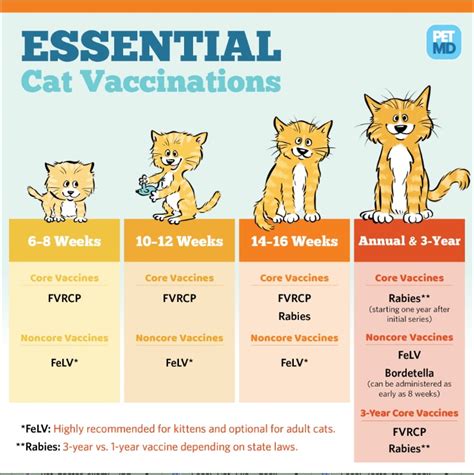Introduction

Cats, as beloved companions, deserve the best possible care to ensure their health and well-being. Vaccination and immunization play a crucial role in protecting cats from potentially devastating diseases. This comprehensive guide will explore the importance of vaccination, recommended vaccines, and potential risks to help you make informed decisions about your cat’s health.
Importance of Vaccination
Vaccines are essential for safeguarding cats against infectious diseases that can cause serious illness, disability, or even death. When a cat receives a vaccine, the immune system is stimulated to produce antibodies that specifically target the disease-causing agent. This preparation enables the cat to fight off infection effectively if exposed in the future.
According to the American Veterinary Medical Association (AVMA), vaccinating cats is one of the most important things pet owners can do to ensure their health:
- Protection: Vaccines provide immunity against specific diseases, preventing illness and serious complications.
- Reduced Transmission: By vaccinating cats, we protect not only our pets but also the entire feline population by reducing the spread of infectious diseases.
- Cost-Effective: Vaccination is a cost-effective preventive measure compared to the potential expenses associated with treating a sick cat.
- Public Health: Some feline diseases can also transmit to humans, making vaccination essential for public health as well.
Recommended Vaccines
The recommended vaccines for cats vary depending on lifestyle, age, and geographical location. The following are the core vaccines widely recommended by veterinarians:
Table 1: Core Vaccines for Cats
| Vaccine | Protection Against | Recommended Frequency |
|---|---|---|
| Feline Viral Rhinotracheitis (FVRCP) | Respiratory infections, including sneezing, nasal discharge, and conjunctivitis | Annually |
| Feline Calicivirus (FCV) | Respiratory infections, including sneezing, nasal discharge, and ulcers on the tongue and gums | Annually |
| Feline Panleukopenia (FPV) | Highly contagious virus that causes vomiting, diarrhea, and dehydration | Every 3 years |
| Rabies | Fatal viral infection that affects the central nervous system | Every 1-3 years, as required by law |
Additional Vaccines
Beyond core vaccines, additional vaccines may be recommended based on your cat’s individual risk factors. These include:
- Feline Leukemia Virus (FeLV): Recommended for cats with increased exposure to other cats, such as those who live in multi-cat households or go outdoors.
- Feline Immunodeficiency Virus (FIV): Recommended for cats with known or suspected exposure to the virus.
- Chlamydia: A bacterial infection that causes respiratory problems, particularly in kittens.
Scheduling and Administration
Vaccinations typically begin when kittens are around 8 weeks old and are repeated at intervals throughout their lives. The schedule will vary depending on the specific vaccine and your veterinarian’s recommendations. Vaccinations are typically administered subcutaneously, with minimal discomfort to the cat.
Potential Risks
While vaccines are generally safe and effective, there are potential risks to consider:
- Mild Reactions: Some cats may experience mild reactions, such as soreness or swelling at the injection site.
- Anaphylaxis: Rare but severe allergic reaction that can require immediate veterinary attention.
- Vaccine Strain Infection: Extremely rare occurrence where the vaccine strain itself causes an active infection.
The benefits of vaccination far outweigh the potential risks. By working closely with your veterinarian, you can determine the best vaccination schedule for your cat while minimizing any risks.
Tips for Cat Owners
- Keep Vaccination Records: Maintain accurate records of all vaccinations, including the date, type of vaccine, and batch number.
- Discuss with Veterinarian: Discuss your cat’s lifestyle, potential risks, and travel history with your veterinarian to determine the best vaccination plan.
- Monitor Your Cat: Observe your cat after vaccination for any adverse reactions. Contact your veterinarian immediately if you notice any concerns.
- Protect Kittens: Kittens are particularly vulnerable, so follow the recommended vaccination schedule to ensure their protection.
- Stay Informed: Stay abreast of new vaccine developments and recommendations to provide optimal care for your cat.
Conclusion
Cat vaccination and immunization are essential components of responsible pet ownership. By understanding the importance of vaccination, recommended vaccines, and potential risks, you can help protect your beloved feline companion from preventable diseases. Working closely with your veterinarian, you can ensure your cat lives a healthy and





















